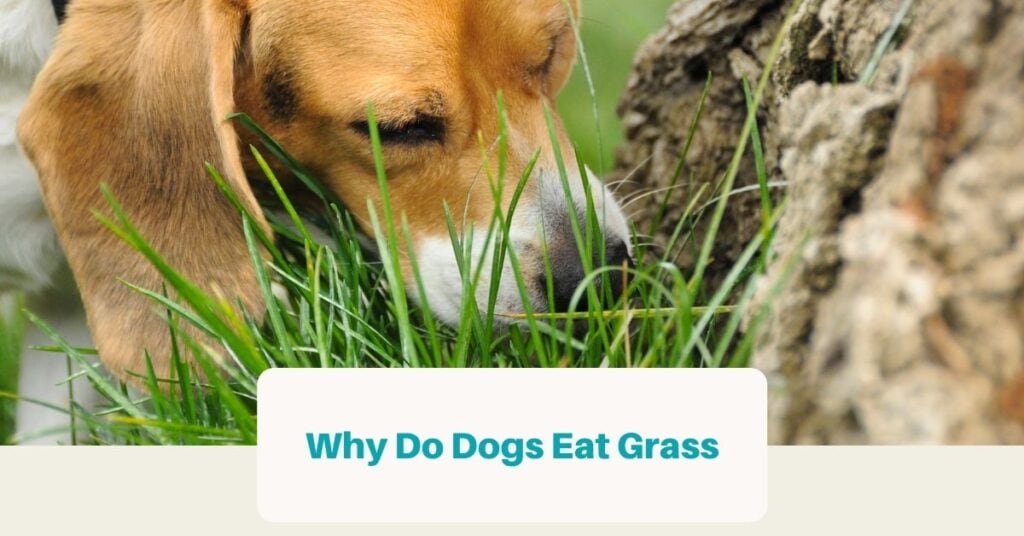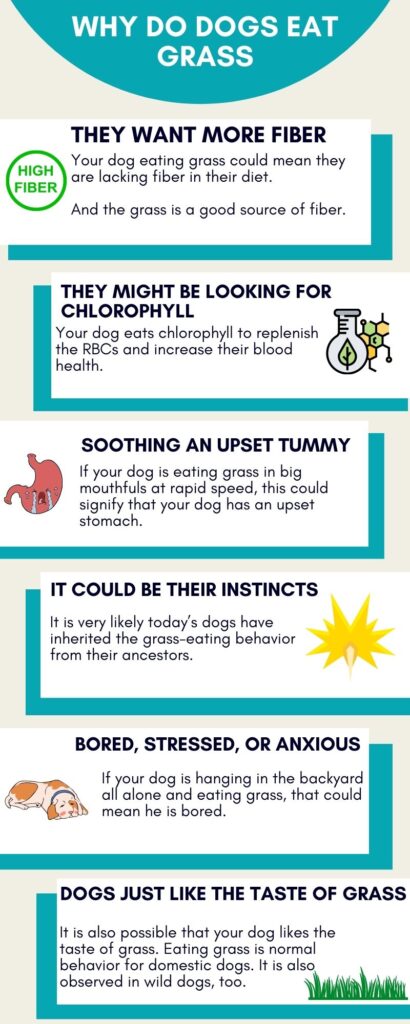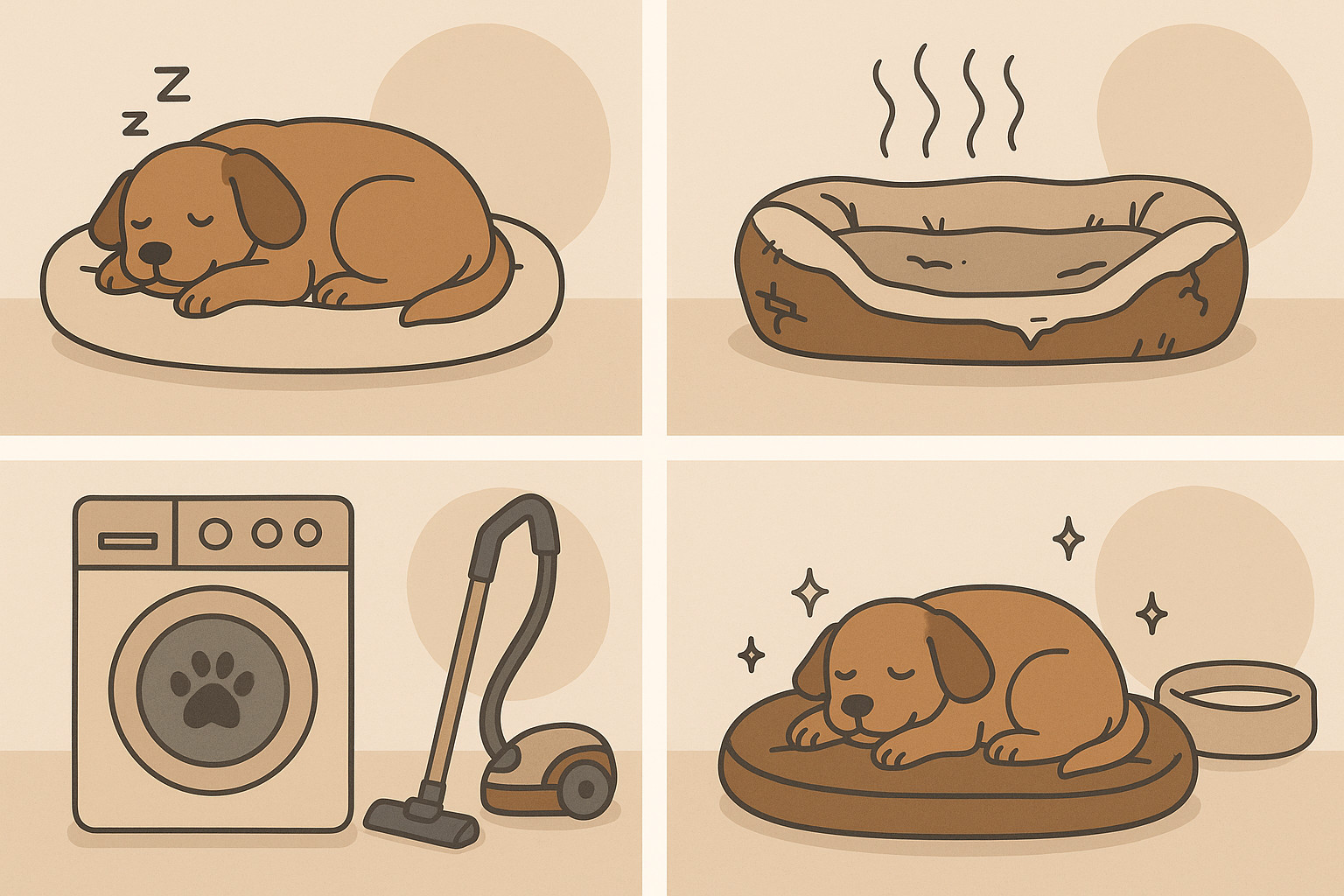
Whenever I saw my dog eat grass, I would always wonder, ‘why do dogs eat grass.’
Don’t worry if you have the same question because I’m confident I can answer the question after thoroughly researching.
Here’s what you will learn in this article:
- Reasons Why Dogs Eat Grass
- They Want More Fiber in Their Diet
- They Might Be Looking For Chlorophyll
- Soothing an Upset Tummy
- They Might Be Hungry
- They Might Have Intestinal Worms
- It Could Be Their Instincts
- They Could Be Bored, Stressed, or Anxious
- Curiosity
- Dogs Want the Attention of Their Parents
- Dogs Just Like the Taste of Grass
- Is Grass Safe for Dogs?
- When Should You Be Concerned About Your Dog Eating Grass?
- How Do I Stop My Dog From Eating Grass?
If you’re interested in learning why dogs eat grass and is grass safe for them, keep reading…
Table of Contents
ToggleReasons Why Dogs Eat Grass
Dogs that eat non-food items like the grass is technically called pica. Pica could sometimes mean that your dog has some nutritional deficiency, but often it can be simply a sign of boredom, curiosity, or your dog just like the taste of the grass.

Below we will explore ten reasons why dogs eat grass.
They Want More Fiber in Their Diet
Your dog eating grass could mean they are lacking fiber in their diet. And the grass is a good source of fiber.
Fibers are great for digestion, passing stool more smoothly, and keeping the Gastrointestinal (GI) tract healthy. Therefore, dogs may want to improve their bodily functions, so they eat grass to obtain fiber.
It is recommended that you change your dog’s food to a higher-fiber content dog food.
They Might Be Looking For Chlorophyll
Your dog might be looking for chlorophyll in the grass.
Chlorophyll is a green pigment found in plants and algae for photosynthesis. Photosynthesis is the process of making food from light.
Chlorophyll has a structure similar to dogs’ hemoglobin found in the red blood cells or RBCs. Hemoglobin’s function is to carry oxygen around the body.
So, your dog eats chlorophyll to replenish the RBCs and increase their blood health.
Your furry friend doesn’t have the option to choose veggies when he needs them. And the grass is not a great source of chlorophyll because it is hard to digest.
So, it would be best if you gave your dog a healthy helping of chlorophyll by mincing or lightly steaming safe veggies like Asparagus, broccoli, or green beans.
Soothing an Upset Tummy
Although, studies have found only 9% of dogs show signs of illness before eating grass. But, if your dog is eating grass in big mouthfuls at rapid speed, this could signify that your dog has an upset stomach.
Your dog might have eaten something which didn’t go well with their stomach, or they might be having acid reflux problems.
Unfortunately, unlike humans, dogs can’t tell what’s wrong with their tummy. So, they engage in such behavior that they think will solve their problems.
And, sometimes, dogs throw up after eating grass. However, it is tough to tell if the dog is throwing up because of the grass or because your dog has an upset stomach.
Anyhow, it would be best if you kept an eye on him.
They Might Be Hungry
Dogs can’t go very long without food. And due to an empty stomach, bile enters the stomach, which irritates the tummy. So, your dog eats grass as an antacid.
An antacid is a substance used to relieve heartburn, indigestion, or upset stomach.
It is suggested to feed your dog as soon as you wake up in the morning. So, when bile enters the stomach, it will break down the food for digestion instead of causing pain.
They Might Have Intestinal Worms
Grass eating and diarrhea could indicate that your dog may have ‘worms.’ There are no studies on dogs yet, but studies on wolves show that their feces contain parasites wrapped around blades of grass. So, the same might be the case for dogs. Meaning dogs eat grass to remove worms from their GI tract.
You can look for these symptoms if your dog has worms:
- Weight loss
- Vomiting or diarrhea
- Developing a pot belly
- Worms in stool
- Lethargic
If your furry friend shows the above symptoms, immediately contact your veterinarian.
It Could Be Their Instincts
Dogs eating grass could be their instincts.
Dogs’ ancestors didn’t eat packaged food; they hunted other animals such as rabbits, goats, etc.
They would eat the whole animal, including the stomach. And, the stomach would include all sorts of things such as grasses.
So dogs’ ancestors would get a completely balanced diet. Hence, it is very likely today’s dogs have inherited the grass-eating behavior from their ancestors.
They Could Be Bored, Stressed, or Anxious
If your dog is hanging in the backyard all alone and eating grass, that could mean he is bored.
If you suspect that your dog eats grass whenever he is bored, stressed, upset, or anxious, it is beneficial to be sure they are getting sufficient exercise.
Another thing that could help is to give your 4-legged buddy a food-containing puzzle toy such as a Kong that challenges him. This way, the puzzle will stimulate his brain and relieve boredom.
Curiosity
It is noted that puppies eat more grass than adult dogs. It is because they are just curious. Younger dogs explore with their mouth. So dogs eating grass is the same as children eating dirt.
Dogs Want the Attention of Their Parents
When the owner’s involvement with their dog decreases, eating grass behavior increases. The reason is simple; dogs crave the attention of their owners. And strange behavior like eating grass is one way to grab the owner’s attention.
Sometimes, dog owners pull their buddy away from a patch of grass, causing the dog to eat grass as soon as they find it because it’s forbidden.
Dogs Just Like the Taste of Grass
It is also possible that your dog likes the taste of grass. Eating grass is normal behavior for domestic dogs. It is also observed in wild dogs, too.
A study showed that out of 47 dog owners surveyed whose dogs had daily exposure to plants, 79% reported that their dog had eaten grass or other plants.
Another report in the same study showed that 3340 dog owners were surveyed online, and 1571 met enrollment criteria. Overall, 68% of dogs were reported to eat plants daily or weekly.
The studies also showed that only 22% of dogs frequently vomited after eating grass, and only 9% showed illness before eating grass.
So, to sum it up, eating grass is normal behavior, and your dog might just like the taste and texture of the grass.
Is Grass Safe for Dogs?
The grass itself is not toxic to dogs, but it can be harmful when sprayed with herbicides or pesticides. Herbicides and pesticides can be lethal to dogs and lead to death in extreme cases. Also, your dog might ingest worms along with the grass from fecal residue from other animals.
When Should You Be Concerned About Your Dog Eating Grass?
When you notice your dog eating grass excessively, obsessively, or more frequently, you need to be concerned.
Additionally, you should be concerned if your dog shows any of the symptoms after ingesting grass:
- Loss of appetite
- Weight loss
- Diarrhea
- Vomiting
- Bloody poo
- Lethargic Behavior
Contact your vet if you observe any of the symptoms.
How Do I Stop My Dog From Eating Grass?
You may want to stop your dog from eating grass in some cases. Here are a few actions you can take.
Whenever you see your dog trying to eat grass, stop him verbally. If he complies, then award him with a food treat. So this way, whenever your dog gets treated for not eating the grass, he will recognize the pattern and stop eating grass.
The Bottom Line
Dogs eat grass because they might need more fiber or chlorophyll in their diet, relieve an upset stomach, or remove intestinal worms. In addition, they might be eating grass just because they are curious, or they just like the taste of the grass. Eating grass is normal behavior in domestic dogs as well in wild dogs. And grass itself is safe for dogs but can be harmful if herbicides or pesticides are sprayed on it.
Contact your veterinarian if you’re in doubt about your dog eating grass.
Relevant Articles:




